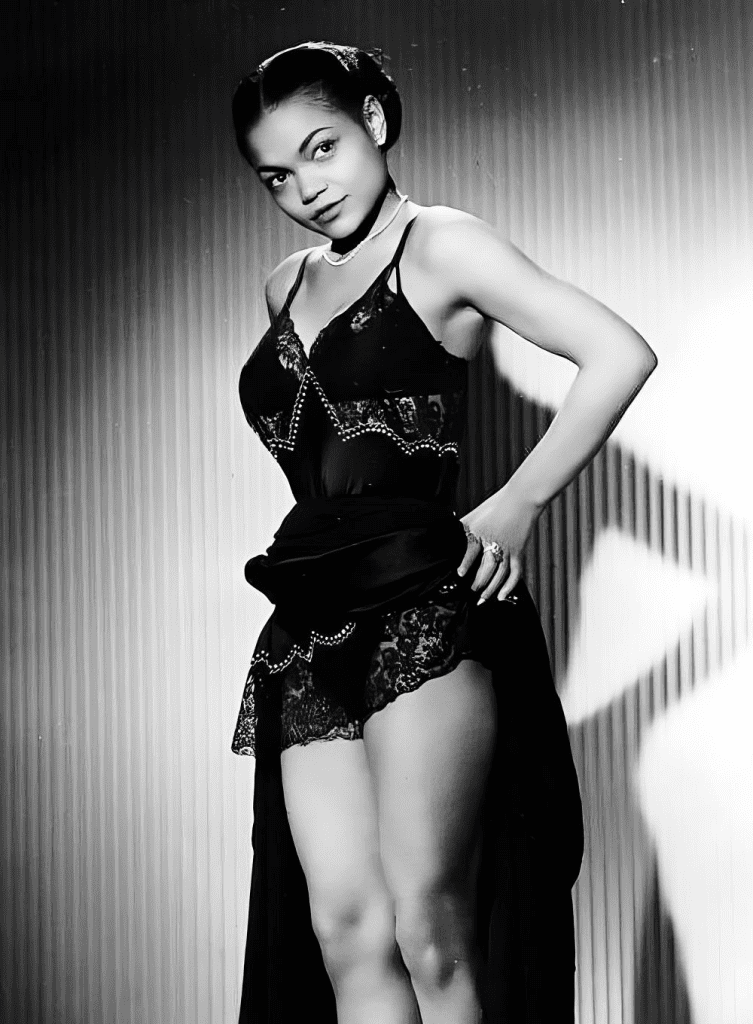Eartha Kitt is remembered for her sultry voice, iconic roles, and trailblazing spirit, yet her life was far more complex and heartbreaking than most realize. Known for timeless hits like “Santa Baby” and a memorable turn as Catwoman on the 1960s Batman series, Kitt’s personal struggles, cultural impact, and fierce independence made her a figure unlike any other. Despite her fame, she carried with her a painful history rooted in rejection, identity struggles, and an unyielding search for belonging. Here’s a look at the extraordinary life of a woman who captivated audiences while facing unimaginable challenges.
A Difficult Start in South Carolina

Born in 1927 in North, South Carolina, Eartha Kitt’s early years were filled with hardship. Abandoned by her mother at a young age and mistreated by relatives, Kitt’s childhood was marked by abuse and struggle. As a child of mixed-race heritage, she faced prejudice and isolation from both Black and white communities, a painful reality that would haunt her throughout her life. She was derisively called a “yellow gal,” a term that implied arrogance, though she was simply a child enduring a cruel world.
Kitt was eventually taken in by a relative known as Aunt Rosa, who forced her to earn her keep through labor, including picking cotton. Tragically, she also witnessed her mother’s death under mysterious circumstances, leaving her with a belief that her mother had been poisoned—a haunting memory that would follow her forever.
From Abuse to Art: Finding Refuge in Dance and Music
At around age eight, Kitt moved to New York City to live with an aunt, and it was there that she began to find a path out of her traumatic past. She attended the New York School of Performing Arts, where her talents blossomed. By her teenage years, Kitt had earned a scholarship to study with the legendary dancer Katherine Dunham, joining her dance troupe and traveling internationally. While touring with Dunham, she was discovered by the acclaimed actor-director Orson Welles, who cast her as Helen of Troy in his production of Dr. Faustus, famously calling her “the most exciting woman alive.”
This exposure helped launch her career, leading to opportunities that would make her a celebrated singer, dancer, and actress. By the early 1950s, Kitt had taken Paris by storm with her sultry nightclub performances, which drew from her raw, emotional background and helped establish her unique persona.
Rising to Fame: A Distinctive Voice in Music and Film
Kitt’s star continued to rise when she returned to the United States, where she appeared in the 1952 Broadway revue New Faces of 1952, performing songs that would become signature hits, like “I Want to Be Evil” and “C’est Si Bon.” Her music career soared with the release of her first album, featuring the now-classic “Santa Baby,” a playful yet provocative holiday song that remains popular to this day.
Kitt’s talent translated seamlessly to film, where she starred opposite Nat King Cole in the biographical drama St. Louis Blues. She went on to receive an Academy Award nomination for her role in Anna Lucasta, further cementing her place in Hollywood. Her distinct style and vocal charm captivated audiences, making her one of the most unique and sought-after performers of her time.
Catwoman Controversy and Speaking Out Against the Vietnam War
In 1967, Kitt took on the iconic role of Catwoman in the television series Batman, becoming the first Black woman to portray the character. Her feline elegance, combined with her deep, purring voice, made her portrayal unforgettable. While she only appeared in a few episodes, her Catwoman left a lasting impression on fans and became a cultural milestone.

But Kitt’s outspokenness nearly ended her career. In 1968, she attended a White House luncheon hosted by First Lady Lady Bird Johnson, where she criticized the Vietnam War, saying, “You send the best of this country off to be shot and maimed. No wonder the kids rebel and take pot.” Her bold statement shocked the audience, and the backlash was swift. Kitt’s popularity plummeted, and she spent years performing overseas, shunned by much of the American entertainment industry. It wasn’t until the 1980s that she began to find her way back into American audiences’ hearts.
A Search for Identity: The Mystery of Her Ancestry
One of the deepest wounds Kitt carried was her mysterious parentage. For most of her life, she didn’t know her father’s identity. As a mixed-race woman born in the Deep South during the 1920s, her father’s identity was hidden from her, likely due to social stigma. When Kitt tried to access her birth certificate in the 1950s, she was denied, but her desire to uncover her roots remained strong. In 1997, when she was 71, she and her daughter, Kitt Shapiro, finally accessed the record—only to find her father’s name blacked out. This unresolved mystery left her with a painful void, underscoring a lifetime of feeling rejected and out of place.
The Resurgence: Finding Her Voice Once Again
Despite the setbacks, Kitt enjoyed a renaissance in the late 1970s with her performance in the Broadway musical Timbuktu!, for which she earned a Tony Award nomination. In 1984, she returned to the music charts with the hit single “Where Is My Man.” Her charisma and talent brought her back into the limelight, and she continued to perform well into her later years, showing an unbreakable spirit and work ethic.

She even earned a Daytime Emmy for her voice role in Disney’s The Emperor’s New School, charming a new generation of fans. Kitt was a regular performer at New York’s Café Carlyle, where her magnetic stage presence was as captivating as it had been decades before. Her resilience and grace turned her career struggles into an inspiring comeback story.
A Life and Legacy Marked by Strength and Resilience
In 2008, Eartha Kitt passed away from colon cancer on Christmas Day, a fittingly dramatic date for a woman whose life had been filled with triumphs and tragedies. Her daughter, Kitt Shapiro, later founded Simply Eartha to honor her mother’s memory, creating products that celebrate Eartha’s strength and individuality.
Eartha Kitt’s legacy goes far beyond her music and acting. She was a pioneer for Black women in entertainment, breaking barriers and challenging norms. Her struggles with identity, prejudice, and rejection only highlighted her strength and resilience, inspiring countless others. As Orson Welles once called her “the most exciting woman alive,” Eartha Kitt truly lived up to that description, leaving behind a legacy that continues to resonate with those who appreciate her talent, courage, and defiance against the odds.


